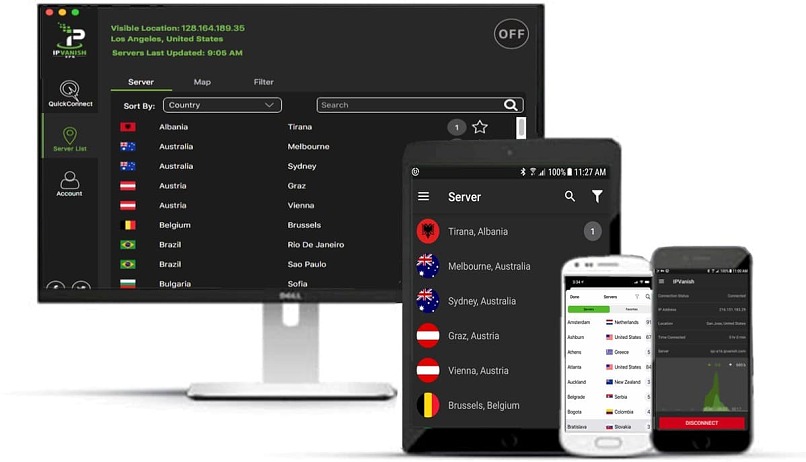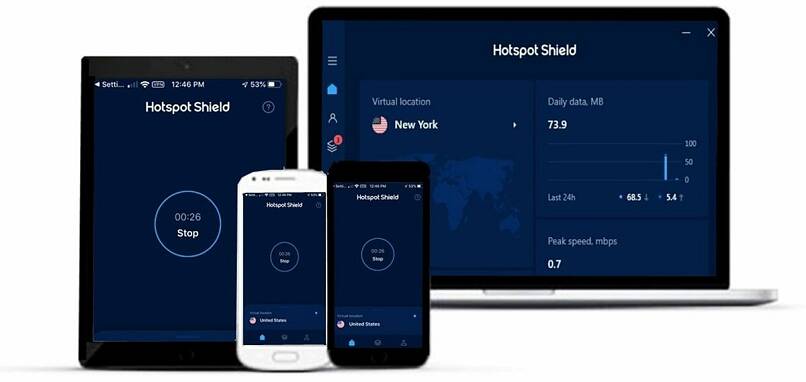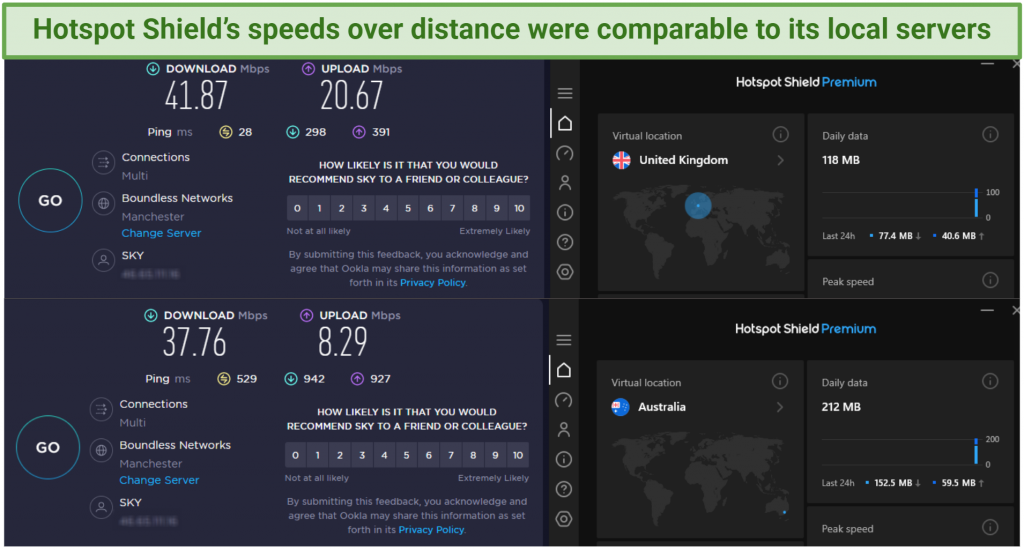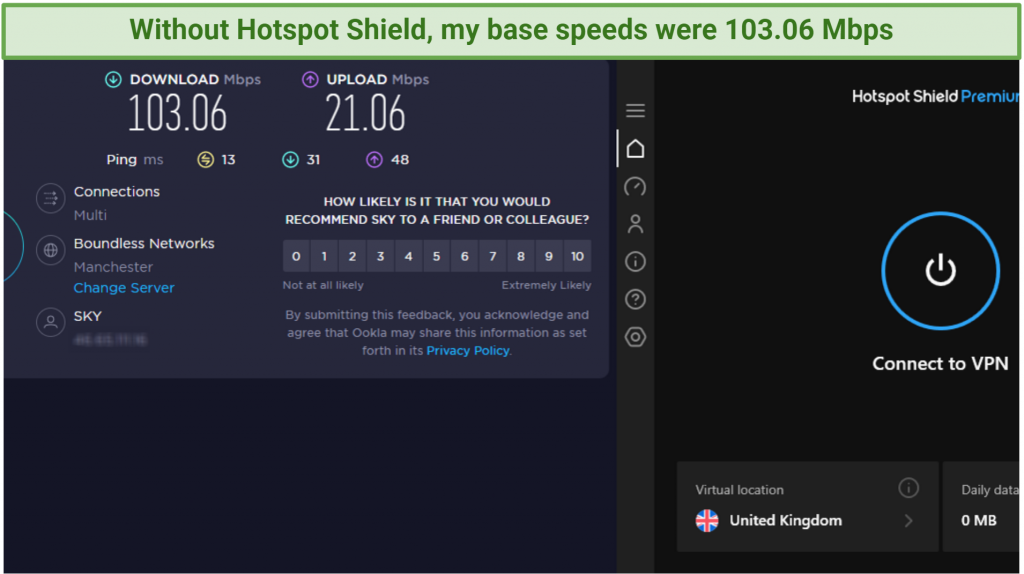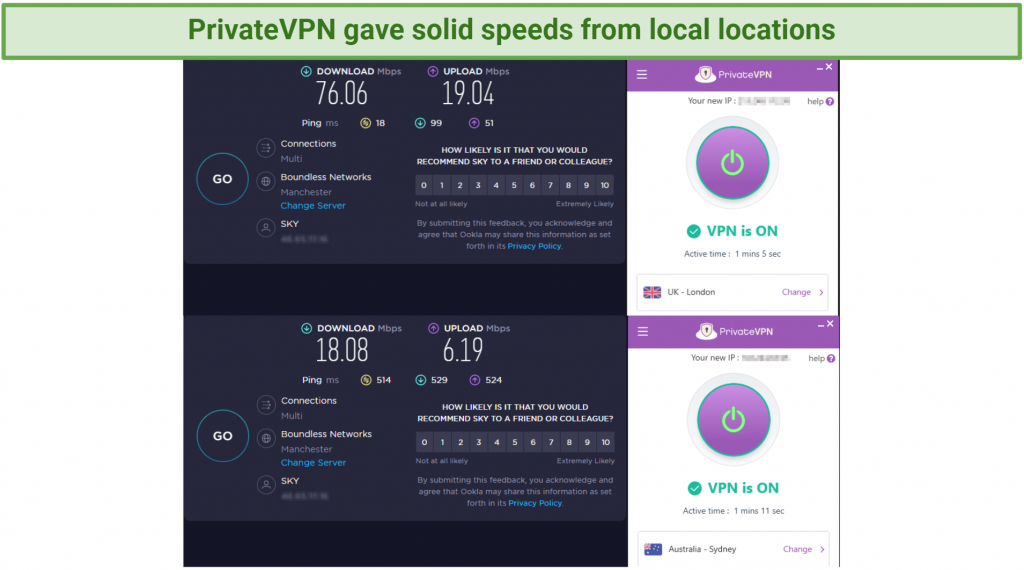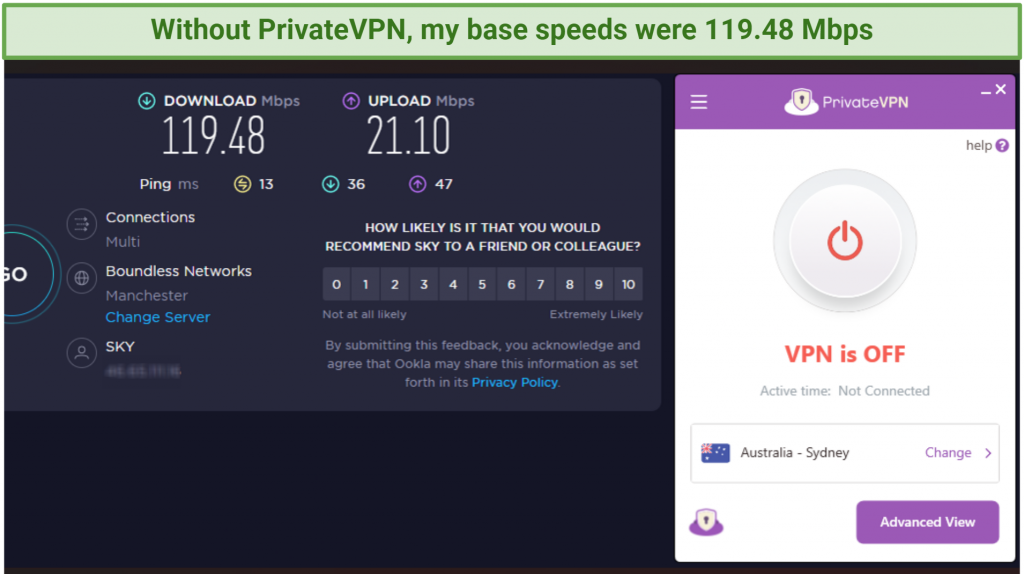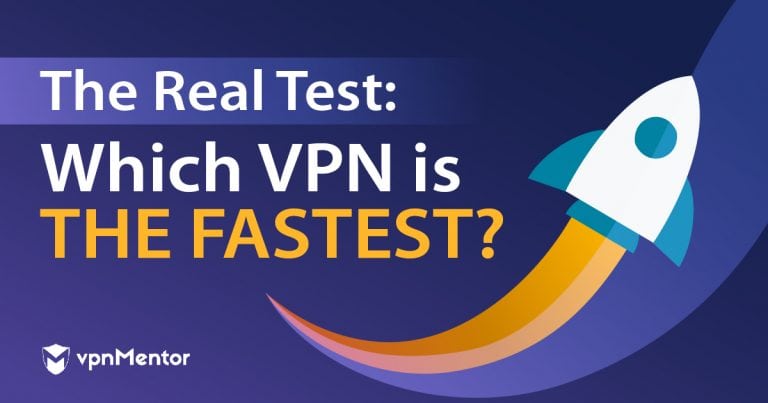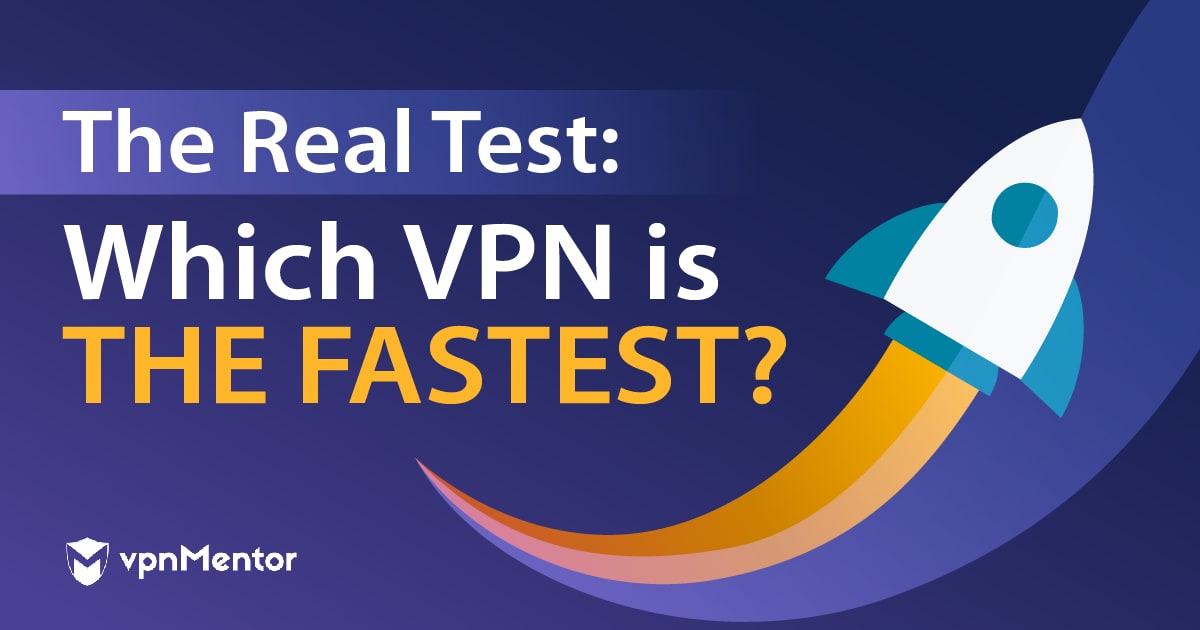
9 Fastest VPNs for High-Speed Connections — Tested in 2023
- Fastest VPNs for High-Speed Connections — Full Analysis (Updated in 2023)
- ExpressVPN — The Fastest VPN We Tested Thanks to Its Lightway Protocol
- Surfshark — Block Annoying Ads to Boost Your Speed With CleanWeb
- NordVPN — NordLynx Bolsters Fast Speeds With Strong Security
- Proton VPN — Overcome Speed Limitations With VPN Accelerator
- IPVanish — Intuitive Interface to Easily Find the Fastest Servers
- Quick Comparison Table: Fastest VPNs
- Research Methodology: How We Tested the Fastest VPNs
- Quick Guide: How to Speed Test Your VPN in 3 Easy Steps
- How to Get Faster VPN Speeds — Simple Hacks
- FAQs on the Fastest VPNs
- Get the Fastest VPN Today
With so many VPNs claiming to be the fastest, it's hard to know which will actually give you the best speeds. Consistently fast speeds are not a compromisable feature, especially when you want to stream, game, or torrent.
My team and I compared more than 55 VPNs in terms of long and short-distance server speeds and overall performance with various online activities. To ensure accuracy and consistency, we tested each at different times of day over many months from the same location using the same device and OS.
ExpressVPN came out on top, with the fastest speeds and most stable connections. Its exclusive Lightway protocol keeps speed loss to a minimum. Plus, its entire global network is optimized for speed, so you can count on fast connections, near and far.
It helps that you can try ExpressVPN risk-free since it offers a 30-day money-back guarantee. If you find it's not for you, it's easy to claim a refund.
Short on Time? Here Are the Fastest VPNs in 2023
- ExpressVPN – Impressively fast Lightway protocol, and a global network optimized for reliable, speedy connections. Plus, intuitive apps that make it easy to find a fast server.
- Surfshark – Speeds up your page loading times with the CleanWeb ad blocker, and avoids annoying CAPTCHA tests with Static IPs.
- NordVPN – Proprietary protocol NordLynx offers high speeds, but its OpenVPN connections are frustratingly slow.
- Proton VPN – Boost your speeds with VPN Accelerator, but high latency on faraway servers makes it a poor choice for gaming.
- IPVanish – Find the fastest connections in any country or city with the intuitive app, but it can’t unblock every streaming platform we tested.
Fastest VPNs for High-Speed Connections — Full Analysis (Updated in 2023)
All of the VPNs listed below offer the speediest connections without compromising your security or privacy online. Things like encryption and certain security features can slow down your VPN connection considerably. The following VPNs all offer advanced encryption, leak protection, and key features like a kill switch, without significant effects on speeds. They also all adhere to strict no-logs policies, which have been vetted and proven, so you know you won't risk your online privacy just to get a faster connection.
1. ExpressVPN — The Fastest VPN We Tested Thanks to Its Lightway Protocol

Tested November 2023
- Highly advanced proprietary Lightway protocol offers exceptional speeds coupled with top security
- 3,000 servers in 105 countries for fast and reliable connections worldwide
- 8 simultaneous device connections
- Works with: Netflix, Disney+, HBO Max, Hulu, Amazon Prime Video, and more
ExpressVPN is the fastest VPN I’ve ever used, thanks to its exclusive Lightway protocol. Before testing, my base speed was 111.92 Mbps. To start the tests, I used the standard OpenVPN protocol, and its nearby UK Dockland server gave me 103Mbps (a 7% speed drop), which I found pretty impressive.
When I tested Lightway, my speed boosted to 109.98 Mbps — just 2% below my base speed. This is a great result considering, on average, most VPNs will slow you down about 10-20% on local servers.
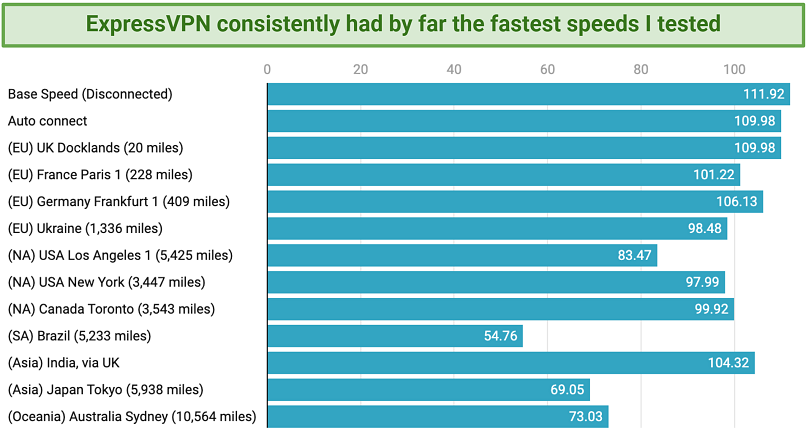 I used the Docklands server to watch 4 episodes of The Handmaid's Tale on Hulu in Ultra HD with no buffering.
I used the Docklands server to watch 4 episodes of The Handmaid's Tale on Hulu in Ultra HD with no buffering.
Its entire network is optimized for fast speeds, too. During my tests, my average from 3 nearby UK servers was 109.24Mbps (-2%). I also tested 3 long-distance servers (Sydney, Los Angeles, and Tokyo). These averaged 75.18Mbps (-33%). Even while connected far away, I had 3 times the speed you need for Ultra HD streaming.
The app is built to give you fast connections. It automatically connects you to the fastest server with its "Smart Location" feature. Plus, a built-in speed checker displays the complete list of servers along with their ping, download, and upload speeds – so it’s easy to find the fastest one for whatever you want to do online.
I found its split tunneling feature especially handy for streaming and torrenting — it lets you encrypt only select sites and apps (like Netflix or uTorrent) to prevent speed loss. Additionally, you can configure presets for your favorite online activities, making it quick and easy to connect and get straight to it.
One minor issue I found is that it's a bit pricier than other top VPNs — its plans start at $6.67/month. Luckily, ExpressVPN offers discounts and coupons; when I signed up, I got it for 49% off. Short-term plans are also available, offering the same features, but they’re not the best value since they cost significantly more in the long-run.
You can test ExpressVPN's speeds without risk since it offers a 30-day money-back guarantee. If it’s not exactly what you want, it's easy to claim a refund. I tested this out using its 24/7 live chat feature — the process was pretty simple. The agent asked me a few user-experience questions, then instantly approved the return. I saw the money back in my account after just 2 days.
2. Surfshark — Block Annoying Ads to Boost Your Speed With CleanWeb
- CleanWeb blocks ads and malicious content for worry-free browsing
- Vast network of 3,200 servers in 100 countries
- Unlimited simultaneous device connections
- Works with: Netflix, Disney+, HBO Max, Hulu, Amazon Prime Video, and more
Surfshark slid into second place, with local and long-distance servers causing slightly more speed loss than ExpressVPN’s while using the WireGuard protocol. But overall, Surfshark’s speeds are impressive, no matter the server’s distance.
It performed consistently well from the global locations I tested. Australia is the other side of the planet from me, so to get 71.22Mbps (a 34% speed drop) is quite remarkable. This let me stream from Netflix, Disney+, Hulu, Max, and more with no issues. This makes Surfshark a great choice if you’re traveling, as you’ll be able to watch your favorite shows no matter where you are.
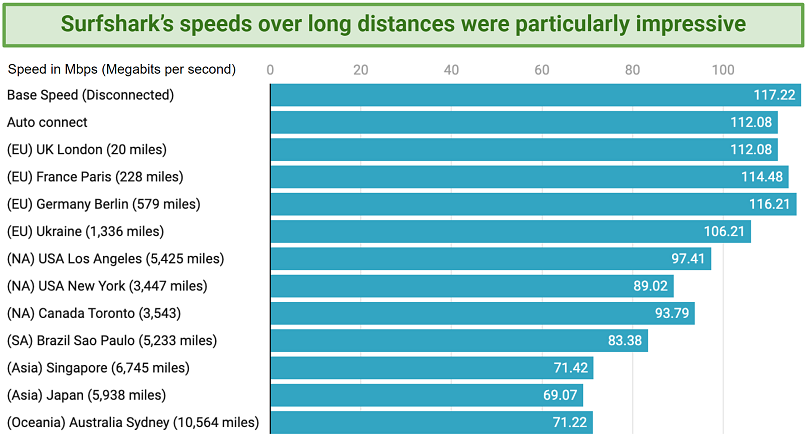 The furthest server gave me a 40% speed loss — some VPNs can’t even match that from nearby servers
The furthest server gave me a 40% speed loss — some VPNs can’t even match that from nearby servers
One of my favorite speed-boosting features is CleanWeb, Surfshark’s highly effective ad blocker, which speeds up loading times by eliminating ads, pop-ups, and cookie requests. In my tests, I activated it with one click, and it turned the internet into an ad-free zone. Pages load quicker without masthead, banner, and sidebar ads, and YouTube videos play instantly with no video ad interruptions.
Surfshark offers unlimited simultaneous connections, and I didn’t notice any major speed drops no matter how many devices I used on the same server. I roped my household into testing this. Even though we were all streaming, torrenting, and gaming at the same time on 8 different devices, none of us had any buffering or lag. My speed tests showed less than a 1% change between using 1 and 8 devices, which I found impressive.
The only slowdowns I encountered happened while connecting. Most of the time, it took about 12 to 20 seconds for the VPN to be enabled (for reference, ExpressVPN takes about 2 seconds or less). Also, I noticed that proximity didn’t seem to be a factor — even nearby servers took a while sometimes. That being said, once connected, I got consistently fast speeds.
With most VPNs, you can save money with longer plans, and this is certainly true with Surfshark. When I subscribed to a long-term plan, I saved 82% compared to short-term. With this plan, you can get Surfshark for $2.69/month.
Surfshark’s plans are all backed with a 30-day money-back guarantee. You have to go through an automated chatbot exchange before you can speak to an agent. Once connected, my refund was quickly approved, and I got my money back 4 days later.
3. NordVPN — NordLynx Bolsters Fast Speeds With Strong Security
- Proprietary protocol NordLynx combines WireGuard’s speeds with strong security
- 5,880 servers in 60 countries for a selection of quick nearby and faraway servers
- 6 simultaneous device connections
- Works with: Netflix, Disney+, HBO Max, Hulu, Amazon Prime Video, and more
NordVPN’s proprietary protocol NordLynx gave me high-speed connections during my tests. It’s based on WireGuard, which is known for its fast speeds, but it’s not widely regarded as the most secure protocol. NordVPN gives you the best of both worlds by boosting its security with double NAT technology.
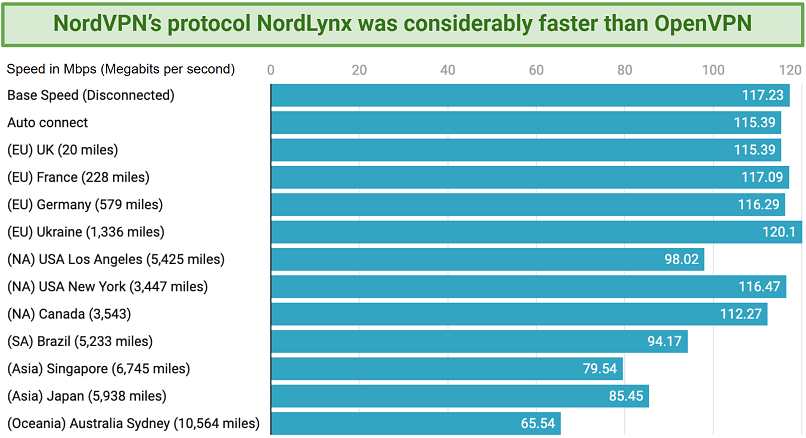 NordVPN only reduced my speeds by 3% on local servers, and about 40% on long-distance ones
NordVPN only reduced my speeds by 3% on local servers, and about 40% on long-distance ones
You can’t use NordLynx on all devices, though. It’s not available on smart TVs, game consoles, or routers. This is disappointing since OpenVPN caused my local speeds (with a UK server) to plummet by over 60% — from 116.96 Mbps to 44.87 Mbps. Luckily, it’s available for all other major devices, including Windows, macOS, iOS, Android, and Linux.
Its Presets feature (on macOS) lets you assign fast servers to your specific online activities. Instead of offering optimized servers for streaming, gaming, and torrenting, it allows you to customize your own profiles for these activities. For instance, I created a Preset called Gaming US, which used the NordLynx protocol and its Miami server, since that gave me the best speeds.
Threat Protection is NordVPN’s ad and malicious site blocker. It works at DNS level, so the ads never even reach your device. Not only do ads clutter up web pages and distract from the content you want, but they also cause longer loading times. When I tested Threat Protection, my browsing was smooth and ad-free.
A range of plans is available starting at $2.99/month for its Standard Plan. When I subscribed, long-term plans all came with 3 months extra, free, which makes them much better value than the short-term option. Plus and Complete plans include a cross-platform password manager which can make it faster to log into sites on different devices.
You can test NordVPN’s speeds with its 30-day money-back guarantee. I tried this out to be sure it was trustworthy. When I logged into the website and clicked Chat, I had to go through a chatbot before speaking to an agent, similar to Surfshark. Within 2 minutes, my refund was approved. I got all my money back 3 days later.
4. Proton VPN — Overcome Speed Limitations With VPN Accelerator
- VPN Accelerator feature lets you increase connection speeds with 1 click
- 3,025 servers in 69 countries for access nearby servers no matter your location
- 10 simultaneous device connections
- Works with: Netflix, Disney+, HBO Max, Hulu, Amazon Prime Video, and more
Proton VPN offers a "VPN Accelerator" to boost your speeds. Using a combination of technologies, it overcomes CPU limitations and improves TCP connections. It sounds techie, but all I had to do was click once to enable it. I was surprised by how easily it bumped me from 88.14 Mbps to 99.43 Mbps using WireGuard on a nearby server, only 4% slower than my base connection.
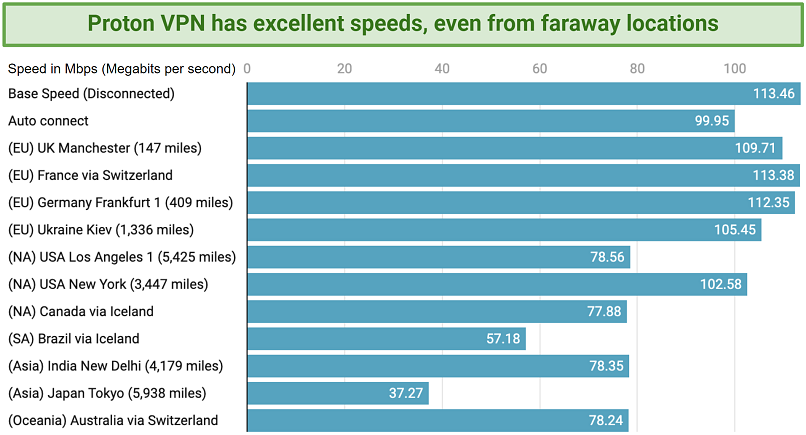 Proton VPN gives you a host of adjustable security settings to get the best speeds
Proton VPN gives you a host of adjustable security settings to get the best speeds
The app has plenty of other options that’ll help you optimize your speeds, too. It offers a choice of protocols, split tunneling, and a built-in ad blocker to improve page loading times. This, in addition to its P2P-friendly network, makes it a great choice for torrenting. You can improve the load speeds of torrenting websites by preventing ads from loading in, and by optimizing my speeds, I was able to download a 3GB file in just under 3 minutes.
Plus, you can create custom profiles with fast connections based on your desired online activity. For instance, I created a "Streaming US" profile that uses the fastest US server (for me) and WireGuard protocol.
Its speeds over distance are particularly impressive. I tested its New Zealand and New Delhi servers (both thousands of miles from me) and found an average 30% speed drop. The minor speed loss was not even noticeable, and I could watch Disney+ without lag. That makes Proton VPN an excellent choice for streaming worldwide content at high speed.
Despite the impressive speeds, its high latency on long-distance servers could be a deal-breaker for gamers. It would be nice if it offered specialized servers for gaming, I couldn't find a US server with a ping lower than 155 ms (under 100 is recommended for gaming). However, its nearby servers were better, averaging 37 ms.
A range of plans are available, but you’ll find a long-term plan costs half as much per month than going short-term. The features are identical, so I’d recommend choosing long-term to save money. You can sign up for Proton VPN for $4.99/month this way.
It's also backed by a 30-day money-back guarantee. I tested this by submitting my request through a contact form on the site, since it doesn’t offer 24/7 live chat. Proton VPN's refunds are prorated, based on your unused days. Since I had 14 unused days, that's what I was refunded for — the money was returned to my account by the following week.
5. IPVanish — Intuitive Interface to Easily Find the Fastest Servers
- Simple user interface makes it easy to find the fastest servers per location
- 2,200 servers in 75 countries for a wide variety of local and long-distance IPs
- Unlimited simultaneous device connections
- Works with: Netflix, Disney+, HBO Max, Hulu, Amazon Prime Video, and more
With IPVanish's comprehensive apps, you'll have no problem finding a speedy connection. Each server is displays the load, with a number between 1-100. The lower the number, the less congested — meaning you'll get better speeds. Additionally, it shows the servers' ping (in ms). A lower ping means less lag for streaming, browsing, and gaming.
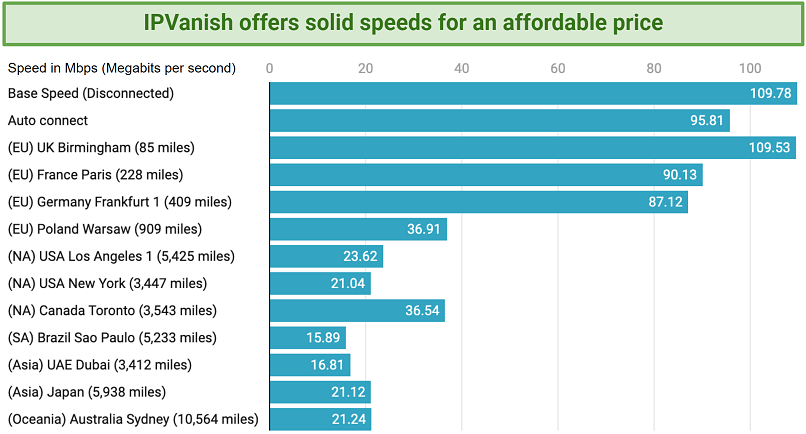 IPVanish gives you 5 protocols to test your speed with, and UDP and TCP options for OpenVPN
IPVanish gives you 5 protocols to test your speed with, and UDP and TCP options for OpenVPN
Alternatively, IPVanish can find the fastest server for you with "Quick Connect". I tested this by selecting Germany. Then, I chose "Best available city" and "Connect", which instantly set me up with its fastest server (in Frankfurt). I got speeds of 87.12 Mbps, just 21% below my base. It was fast enough to stream Netflix in Ultra HD, so I "favorited" it for easy access.
Each IPVanish account offers SOCKS5 — which changes your location without encrypting your data. I configured it to Firefox in under 5 minutes to access Prime Video US. While my ping was on the higher end (115 ms), there was no reduction in my download speeds. Encryption is what slows VPNs down the most, so if security isn’t a significant concern, you can use this proxy connection as a faster (but less secure) alternative.
Unfortunately, IPVanish couldn’t unblock all the streaming platforms I tried. I wasn’t able to access Prime Video US or DAZN. That being said, I could unblock Netflix, Disney+, and HBO Max with no problems.
There are a couple of signup options — the cheapest plan is $2.99/month. Considering IPVanish lets you connect an unlimited number of devices simultaneously, it's great value. In addition, there's a monthly plan including the same features. However, it's much pricier, so you'll get the best deal by going long-term.
IPVanish offers a 30-day money-back guarantee, as well. When I tested its refund process, I didn't even have to contact an agent. I simply logged into my IPVanish account and followed the prompts to cancel my subscription, which took a few minutes. I got my money back after 5 days.
6. CyberGhost — Optimized Servers for Quick Access to High-Speed Connections
- Specialized servers for gaming and torrenting, and for easy access to streaming platforms
- 9,561 servers in 100 countries give you fast speeds from any location
- 7 simultaneous device connections
- Works with: Netflix, Disney+, HBO Max, Hulu, Amazon Prime Video, and more
CyberGhost has optimized servers, giving you fast and reliable connections for various activities. I tested 9 specialty servers — 3 from each category: streaming, gaming, and torrenting. On average, they were 11% faster than regular servers in the same locations.
The streaming options are labeled according to the sites they work best with. I tested its Netflix US server by watching 3 episodes of Wednesday in Ultra HD and didn’t experience any choppy picture quality or buffering.
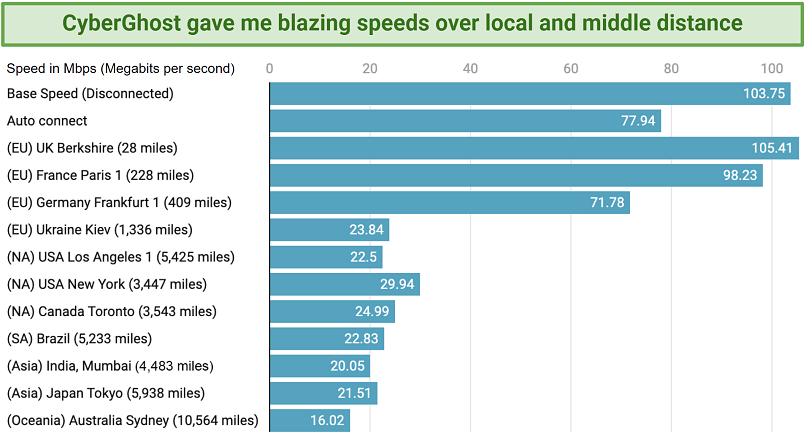 Using WireGaurd, CyberGhost gave me impressive speeds with nearby locations but lowered my speeds by 88% over long distances
Using WireGaurd, CyberGhost gave me impressive speeds with nearby locations but lowered my speeds by 88% over long distances
It boasts 9,561 servers in 100 countries, so it’s easy to find speedy connections. I tested servers in Germany, France, and the UK and found an average of 99.76 Mbps (a speed loss of around 11%, which is great). While testing CyberGhost, I connected to the “For downloading” location in Switzerland and downloaded a 3.1 GB torrent file in 3.5 minutes.
Unfortunately, its long-distance speeds weren’t great. That can be an issue if you need to use faraway servers and your base speed is slow. It wasn’t a problem for me since I have a fast base connection — even with an 85% speed drop, I still had 16 Mbps and could stream in HD without buffering. Just make sure you’re using the WireGuard protocol for the best possible speeds.
You can get a subscription for just $2.11/month. When I signed up for a long-term plan, it included 2 additional months for free. Short-term plans are available with the same features, but will cost you much more overall – and they only offer a 14-day money-back guarantee.
However, with a long-term plan, CyberGhost offers a 45-day money-back guarantee. When I requested my refund, I used the 24/7 live chat option. The agent wasn't pushy and only asked why I wanted to cancel. Then, they issued the refund, which I saw in my bank account after 3 days.
7. Private Internet Access — Massive Server Network for a Wide Variety of Fast, Nearby Connections
- 29,650 servers in 91 countries to ensure fast and reliable connections
- Unlimited simultaneous device connections
- Boosts webpage loading times by blocking ads, trackers, and malware with MACE
- Works with: Netflix, Disney+, HBO Max, Hulu, Amazon Prime Video, and more
Private Internet Access (PIA) has one of the most extensive global server networks, including servers in all 50 US states. With a wide selection of servers, I was able to find one that let me play Valorant while connected to New York. It was a surprise I had no latency or lag, even though I’m across the Atlantic.
Nearby, I tested France, Frankfurt, and UK Southampton, which averaged 98.73Mbps (12% lower than my base speed). Since users are distributed across so many servers, there was no overcrowding, so my connections remained stable.
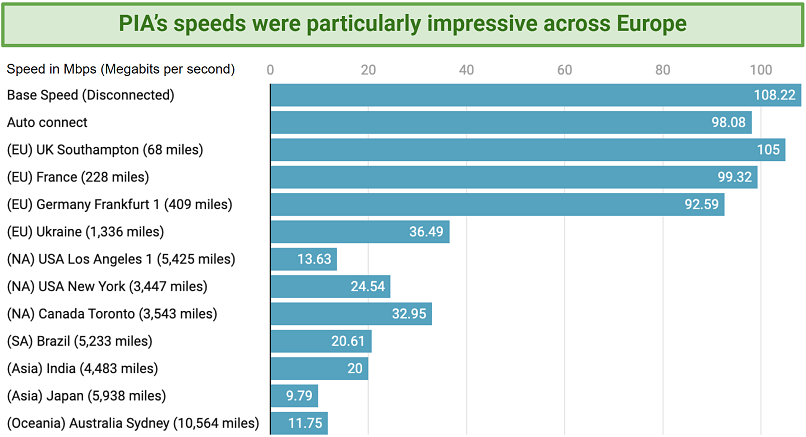 On average, local servers dropped my speeds by 11% and long-distance ones by 93%
On average, local servers dropped my speeds by 11% and long-distance ones by 93%
The app offers a variety of features to help you get the best speeds. Its port forwarding feature is helpful for torrenting, connecting you directly to more seeders for speedier downloads. You can also switch from 256-bit encryption to 128-bit for faster speeds — although, it's not quite as strong security-wise.
While testing PIA, I got an easy speed boost with split tunneling — I used it to route only Netflix US through the VPN. My speeds remained high since less data was encrypted, so I could binge-watch Manifest in Ultra HD without delays.
With so many customization options, PIA’s apps can be a little complex for VPN newcomers. That said, these features can help optimize your speed. For example, Performance shows your download and upload speeds, so you can easily find fast connections.
You can sign up for as low as $2.11/month with a long-term subscription; sometimes, it even includes some additional months, free. I advise going with a long-term plan — the short-term options offer the same features but at a higher cost.
PIA's 30-day money-back guarantee covers all plans. When I tested this policy, I had no issues. Using 24/7 live chat, I made my request and answered a few questions. My refund was approved, and my money was back within 4 days.
8. Hotspot Shield — Unique Hydra Protocol Reduces Slowdowns Over Long Distances
- Proprietary protocol Hydra is designed specifically for fast speeds
- 1,800 servers in 80 countries to find a local server for the fastest speeds
- 5 simultaneous device connections
- Works with: Netflix, Disney+, HBO Max, Hulu, Amazon Prime Video, and more
Hotspot Shield’s own Hydra protocol gave me decent enough speeds, but they weren’t as impressive as those offered by ExpressVPN or Surfshark. I tested 2 servers in Los Angeles and found an average of 45.49Mbps, which is a staggering 60% drop. My speed dropped to 37.76Mbps (-76%) on an Australian server – still more than enough to watch Black Panther on Disney+ with zero buffering, though.
Although the results might not appear exceptionally remarkable, Hydra outperformed WireGuard by 3% in my tests. IKEv2 (IPSec) is also an available option, which is beneficial for mobile devices due to its ability to transition between data sources. On my iPhone, it was only 0.5 Mbps slower than Hydra.
The app displays info to help you find the fastest server. For example, it comes with a built-in speed testing tool. This helped me determine the fastest connection for torrenting (supported on all servers) based on my location. You can also view the load percent and latency of servers. Recent connections show up in “Quick access” above the server list, although, unlike most VPNs, there’s no automatic “Quick connect” button.
Its plans are more expensive than some, starting at $2.99/month. However, while signing up, I discovered that Hotspot Shield offers discounts of up to 77% on select plans. Short-term subscriptions are also available but will end up costing you much more.
You can rely on its 45-day money-back guarantee — I tested it myself. All I did to get my refund was make a request via the 24/7 live chat. The agent asked for a reason, and after a minute or so, issued the return. I had my money back after 7 days.
9. PrivateVPN — Customizable Settings to Balance Speeds and Security
- Plenty of settings you can toggle to improve speeds
- 200 servers in 63 countries for a variety of quick connections
- 10 simultaneous device connections
- Works with: Netflix, Disney+, HBO Max, Hulu, Amazon Prime Video, and more
PrivateVPN lets you adjust its settings to balance security and speeds. It only offers OpenVPN, but it allows you to choose you encryption level. 128-bit is slightly less secure, but it’s a little faster than 256-bit. Its Stealth VPN feature enhances your security. I found it to be faster than rival obfuscation features, reducing my speeds by just 30%.
PrivateVPN combats speed loss using a "High Quality Network". Meaning, it purchases internet capacity directly from IP transit providers. This helps prevent speed loss that can result from using hosting companies.
A drawback of PrivateVPN is its limited server network, which means not every country has multiple locations. Consequently, you might experience congestion and decreased speeds. However, during my testing, I was able to stream in Ultra HD, browse, game, and torrent without any issues.
Subscriptions are budget-friendly, starting at just $2/month. Short-term plans are available, offering the same features. However, you're best off going long-term since you'll make significant savings.
The plans also include a trustworthy 30-day money-back guarantee. The refund process is quick and easy — when I tested it, I used live chat to make my claim. After asking a few questions, the rep approved the refund. Within a week, I saw the money in my account again.
Quick Comparison Table: Fastest VPNs
A fast VPN provides high speeds not just locally, but at long distances, too. However, some VPNs performed better on local connections, and some were better over long-distance. What's also important is the VPN's stability to keep your connection from suddenly dropping. A VPN can also minimize slowdowns by offering lightweight, fast protocols and an extensive server network.
Although a decrease in speed is an unavoidable aspect of using a VPN, multiple factors can influence the speed and therefore result in varying outcomes based on your original connection, location, time of day, and internet service provider (ISP). It is ideal to aim for a maximum decrease of 40% on local connections to ensure optimal performance.
For speedy torrenting, port forwarding is a useful speed-booster. This feature allows your torrent client to connect you directly with more peers than you’d normally be able to. This way, your torrent client gives your seeds priority, considerably improving your download (and upload) speeds.
VPN Speed Test Results: Compared
The subsequent graph demonstrates the average reduction in speed for each VPN, which I then converted into a depiction of the remaining percentage from my original speed. Therefore, percentages closer to 100% are more desirable. However, this comparison only considers speeds in Mbps and does not take into account other elements, like consistency or latency.
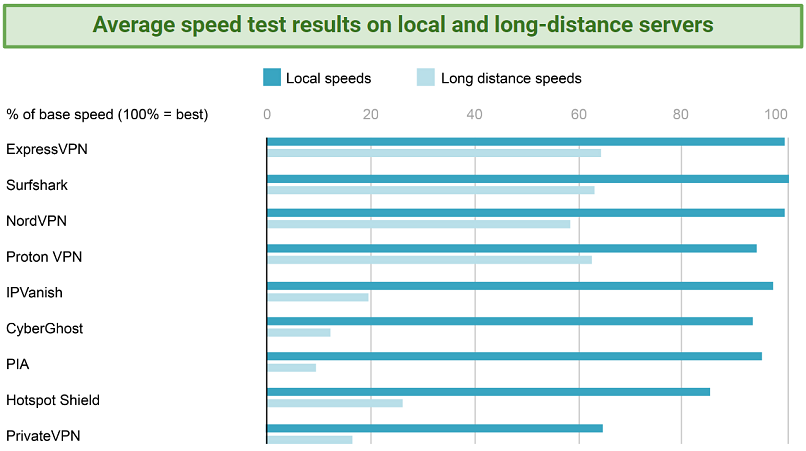 Note that my base speeds fluctuated during testing, so these results are an average based on all my results
Note that my base speeds fluctuated during testing, so these results are an average based on all my results
Research Methodology: How We Tested the Fastest VPNs
I vigorously tested these VPNs' speeds to come up with accurate figures. You can use this to judge how they’ll affect your connection. All these speed tests were performed from my location in the UK. I used my macOS desktop and a broadband line connected with an ethernet cable. I always used the same speed test tool (Ookla) with a base speed of around 110 Mbps.
For local speed test results, I chose 10 server locations within 500 miles of my actual location and ran tests in the morning, afternoon, and evening. The same process was used for long-distance results but with server locations at least 9,000 miles away. This helped me to find an average speed from 30 results, taking peak periods and potential network congestion into account. Plus, it helped me to check whether a VPN offered stable connection speeds.
In an attempt to maintain the uniformity of the results, I endeavored to select the same server locations for each VPN. However, due to differences in network coverage, I occasionally had to opt for servers in alternative locations that were roughly at the same distance.
While we’ve worked hard to build an accurate representation of how each VPN performs, it’s hard to fully quantify these measures. VPN speeds will always vary depending on your base connection, time of day, location, ISP, the server you use, and lots of other factors that we can’t control in our tests. That said, you shouldn’t encounter more than a 40% speed decrease on local servers with any of my recommended VPNs.
I also considered the following:
- Fastest protocols offered. All VPNs in this list offer high-speed protocols; in most cases, the fastest is WireGuard. However, some VPNs have proprietary protocols that outperform WireGuard, such as ExpressVPN's Lightway and NordVPN’s NordLynx.
- Consistency and stability. I stayed connected for hours at a time, testing throughout the connection period to ensure speeds didn’t fluctuate heavily. I noted whether my connection was stable, or if I was ever suddenly disconnected from the VPN.
- Good ping and P2P functionality. While high download speeds are crucial for smooth performance, ping (latency) is also important — especially when gaming. Ping measures the time it takes to process your inputs, so I chose VPNs that show this information to help you select responsive connections. I also chose some VPNs with speed-boosting features for torrenting, like SOCKS5 proxy support and port forwarding.
Quick Guide: How to Speed Test Your VPN in 3 Easy Steps
- Get a VPN. I recommend ExpressVPN since it offers its own superfast Lightway protocol, plus a huge server network for reliable, speedy connections worldwide.
- Check your starting speed. Before connecting to your VPN, navigate to an online speed testing tool (like Ookla) to see what your base connection is. Take note of this number.
- Connect to and test your VPN. Choose a location from your VPN's server list to test — nearby servers will be the fastest. Then, run another speed test using the same tool. Compare your speeds with and without the VPN.
How to Get Faster VPN Speeds — Simple Hacks
Employing a VPN will marginally reduce your connection speed, but adhering to these suggestions can help mitigate the effect.
- Use an ethernet cable. You’ll see the fastest base speeds when you hardwire your computer to the internet. A faster base speed will result in a faster VPN connection speed. Use WiFi only when necessary.
- Connect to a nearby server. In most cases, the further your data has to travel, the more your connection speeds will slow. Use a local server whenever possible for minimal speed loss. For instance, using a nearby server is sufficient to protect your data while using your banking app — although, it’s not always ideal for overcoming geoblocks.
- Check the server load. Fewer users usually result in faster speeds. Server load is often displayed as a percentage, with low being less crowded ( <15%) and high being very crowded (>75%).
- Use the VPN’s fastest protocol. Check for a speed-optimized protocol, like Lightway or NordLynx. Otherwise, WireGuard usually provides the best speeds. If you use OpenVPN, also make sure you use UDP, which was faster than TCP in my tests.
- Adjust your encryption level. Some VPNs allow you to switch to 128-bit encryption, which is a tad less secure but can boost your speeds.
- Set up split tunneling. Some VPNs offer this feature — it allows you to select which apps or websites to route through the VPN while the rest of your traffic stays local. For instance, you can protect your torrenting apps with the VPN but keep your Netflix region local. Since you won't be encrypting unnecessary traffic, you'll be reducing speed loss.
- Try different ports. Some VPN-blocking technology restricts particular ports that are associated with VPNs. You can sometimes get around these limitations by switching ports. In addition, port forwarding (if offered) can help boost your speeds — particularly for torrenting since it connects you directly to seeders.
- Review your software and hardware configuration. If you’re using an older computer, a weak processor, or have insufficient RAM, your speeds won’t be optimal. Likewise, some computer programs may interfere with VPN usage. If possible, temporarily shut down programs that may eat up bandwidth (torrenting software) or prevent your VPN from accessing the internet (antivirus software).
FAQs on the Fastest VPNs
What affects a VPN’s speeds?
Your base connection, server distance and load, VPN protocol, encryption, and whether you’re using UDP or TCP all affect a VPN’s speeds. While the fastest VPNs are designed to minimize speed loss, your speeds will still fluctuate depending on these factors. That’s because your traffic is routed through at least one additional server before it reaches its final destination, which slows your connection. This server’s load can slow your connection further, particularly during peak times.
On top of that, encrypting your data takes time (but it’s well worth it to keep you safe online). Some encryption algorithms and protocols are more data-intensive than others, which can slow your connection down as well. Similarly, connections with the UDP protocol are usually faster as it doesn’t wait for missing packets (or chunks of data) as the TCP protocol does.
All of this means it’s hard to control for every factor affecting a VPN’s speeds during tests. I recommend trying different VPNs yourself to see how well they perform on your connection, as our speed tester’s setup isn’t going to be exactly the same as yours.
How can I improve my VPN speeds for gaming?
The main factor is finding a server with low latency. This is usually going to be the nearest connection to your location. If you're wanting to play in another region, check the VPN app to find the server in that region that's nearest you (or nearest the gaming server). Some VPNs list each server's ping, distance, and user load to make it easier for you to select the best gaming connection.
Some games even display their ping. Otherwise, you can run a simple ping test — here's how:
- Note the server you'll be using. Find out the domain or IP address of the game's server you'll be playing on. This may take some research.
- Open Command Prompt/Terminal. Which you'll open depends on whether you use Windows or macOS. You can find these by using your search bar to type either "Command Prompt" or "Terminal".
- Find out the ping. In Command Prompt/Terminal, type "ping" followed by the game's server domain or IP address. Take note of this number. Then follow the same instructions after connecting your VPN to make a comparison.
You can also improve your speeds by switching to the VPN's fastest protocol. WireGuard is generally the fastest — however, some VPNs offer their own speed-optimized protocols (like ExpressVPN and Hotspot Shield). Aside from protocols, I recommend checking your VPN app for speed-boosting features, such as hide.me's Bolt.
Which VPN protocol is the fastest?
WireGuard is usually the fastest, but it doesn't beat a few VPNs' proprietary protocols. You can sometimes get even better speeds than WireGuard by using a VPN's unique protocol. I experienced an immediate speed increase in both instances — when I switched to ExpressVPN's Lightway, for example.
Not all VPNs offer their own protocol or even WireGuard. As a runner-up, OpenVPN produces decent speeds while providing strong security (but only with UDP). On the other hand, PPTP and L2TP are older protocols that offer fast speeds but at the cost of reduced security.
How can I boost my torrenting speeds with a VPN?
There are a few things you can do to get faster speeds for P2P sharing. However, I consistently got the fastest torrenting speeds with ExpressVPN without having to configure any special features. That said, you can also try the following to get better torrenting speeds:
- Enable port forwarding. Many VPNs offer torrenting-specific features to help boost speeds, such as port forwarding. This feature allows you to connect to more seeders and peers to increase speeds. For example, with Proton VPN, toggle port forwarding on, and it will generate the number of a port that you can then paste into your torrent client’s settings.
- Disable NAT firewall. NAT firewalls can also cause slow torrenting speeds. Some VPNs offer the option to disable these firewalls in settings, which will prevent you from failing to connect to seeders (and from peers failing to connect to you).
- Use a SOCKS5 proxy. Some VPNs, such as IPVanish, offer SOCKS5 proxy credentials, which can also boost torrenting speeds. I advise caution though; this happens outside the VPN, so it doesn't encrypt your data. Still, it’s an option if you’re not too concerned with privacy.
Will a VPN speed up my internet connection?
In most cases, no, it won't give you speeds faster than your base connection. However, the fastest VPNs will maintain speeds as close to your starting point as possible by minimizing speed loss.
On the other hand, if your ISP throttles your speeds, a VPN can actually increase your speed. Sometimes ISPs will throttle your speeds if you're using a lot of data in your online activities — such as torrenting. Using a VPN can prevent this by encrypting your traffic, so your ISP won't see what you are doing online. This way, you can avoid having your connection throttled.
That being said, since VPNs encrypt your data, you'll get a minor speed decrease. If the speed loss is significant, it can cause noticeable effects. This is why it's best to opt for a VPN that offers lightning-fast protocols and speed-increasing features, to help with buffering and reduce lag.
VPN browser extension vs app: which is faster?
VPN browser extensions can sometimes be faster than VPN apps, but that’s usually because they’re just proxies and don’t offer encryption. Uniquely, ExpressVPN’s browser extension connects directly to the main app, giving you the full protection of a VPN. Plus, it’s the fastest VPN I tested.
While proxies change your IP address like a VPN, they don’t encrypt your data and will only work within the browser. As long as you choose a fast VPN, then you shouldn’t need to risk your security and privacy with a VPN extension anyway. The VPN’s app will protect your entire device with military-grade encryption and offer a much more extensive server network in most cases.
What is the fastest VPN for Android?
I found ExpressVPN to be the fastest Android VPN. When I tested it with my mobile phone, it gave me 94.01 Mbps which was just 6% slower than my base speed. Some VPNs limit the protocols you have access to on your mobile device. However, ExpressVPN offers its Lightway protocol on Android.
During my tests, I didn't experience any buffering while streaming Netflix on my Android tablet or phone. It worked just as well with gaming — I could easily find a low-latency server to play PUBG MOBILE without lag.
How do I find the fastest VPN server?
Usually, the closest server to you will be the fastest. It's also best to find a server with low user load because congestion causes speed loss. The VPNs on my list provide information to help you easily identify the fastest server based on your location.
Some VPNs display your distance to the server, user load, ping — or a combination. Alternatively, you can use the VPN's quick-connect feature. This will allow the VPN to select the fastest server based on your location.
How much speed loss is normal when using a VPN?
Due to the security provided by VPNs, you can expect a speed loss of up to 40% on local servers. This speed drop is larger on long-distance servers, and our speed tester found a drop of up to 80% in some cases. However, some VPNs are faster than others, and every VPN on this list has a variety of features that help reduce how much speed loss you can expect.
Bear in mind that VPN speeds are affected by a variety of factors like your location, time of day, VPN protocol, and more. You may have a slower connection speed during peak times in the country where your chosen server is based. However, every VPN on my list offers stable speeds throughout the day, so you won’t have to worry about any major speed drops due to increased network traffic.
What’s the fastest free VPN?
I haven’t found a fast free VPN — but the VPNs in this list offer a money-back guarantee. Although they're not free, you can try them with the assurance that a refund will be granted should you ask for it within the allocated timeframe. This gives you time to test speeds and try them with online activities like streaming, gaming, and torrenting.
The problem with free VPNs is that they are extremely limited. They come with severe data and speed caps, making it almost impossible to use them for much. It’s also normal for free VPNs to only offer a few servers, so congestion reduces speeds even more. The data allowance is usually only enough for 1-2 hours monthly for streaming. These limitations are put in place to encourage you to upgrade to a paid plan.
Plus, they can slow you down even more by interrupting you with targeted ads. It's not worth it when you can get a premium VPN for the monthly price equivalent to a coffee.
Get the Fastest VPN Today
With so many VPNs claiming to have the best speeds, it takes a lot of testing to determine which are truly the fastest. Still, I wanted to get to the bottom of it, so I took the time to do the testing myself. The VPNs that made it to my shortlist give you top speeds by offering superfast protocols, large server networks, and easy-to-use features.
From these, ExpressVPN is the fastest VPN I tested. It offers its own Lightway protocol and a huge network of consistently-fast servers that give you speedy and reliable connections. Meaning, you can enjoy streaming, browsing, gaming, and torrenting without interruption. Plus, it comes with a 30-day money-back guarantee, so you can test ExpressVPN’s speeds risk-free. If it’s not for you, it’s easy to claim a refund.
To summarize, the fastest VPNs in 2023 are...
Your data is exposed to the websites you visit!
Your IP Address:
Your Location:
Your Internet Provider:
The information above can be used to track you, target you for ads, and monitor what you do online.
VPNs can help you hide this information from websites so that you are protected at all times. We recommend ExpressVPN — the #1 VPN out of over 350 providers we've tested. It has military-grade encryption and privacy features that will ensure your digital security, plus — it's currently offering 49% off.




